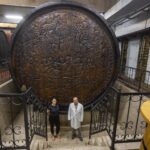During the early hours of the 1st of October, 1991, the JNA’s barbaric attack on Dubrovnik and the surrounding area began.
During the hazy hours of dawn, exactly 26 years ago, the Yugoslav People’s Army (JNA), readily aided by Serbian-Montenegrin aggressors, began their primitive and senseless attack on the Pearl of the Adriatic, the surrounding areas, on land, sea, and from the air. The innocent city remained without electricity and water, rendered almost entirely cut off from the rest of Croatia, and indeed from the world.
In a conscious effort to establish their overall goal of completely cutting Dubrovnik off from any possibility of help from elsewhere as they began on their path of the needless and wanton destruction of the city, the aggressors rocketed the repetitor, relay and information building located on top of Mount Srdj, causing an interruption of telephone lines and severe damage to radio links.
October the 1st, 1991, marked the beginning of a horrendous and unjustifiable attack on the arts, history, culture, innocence, and perhaps above all else – peace. Peace had been associated with Dubrovnik since the glorious days of the Dubrovnik Republic (Ragusa), a formerly autonomous, self-governing republic which promoted the then very progressive ideas of peace, equality, human rights and diplomacy during the tumultuous era which was all but dominated by the Ottoman Empire, the jealous Venetians and the Mediterranean shipping crisis.
To witness the city which banned slavery before the United States even existed as a nation and upheld the meaning of freedom and individuality in the face of a disagreeing outside world attacked by the backward ideals of the JNA, intent on raising the UNESCO World Heritage Site to the ground for absolutely no clear reason, was an event so deeply shocking and painful to the world that it rightly earned the Yugoslav People’s Army international condemnation, and caused an enormous public relations disaster for both Montenegro and Serbia, cast aside by the international community.
The vile behaviour seen directed towards Dubrovnik only continued to further Serbia and Montenegro’s political and economic isolation, earning them extremely powerful enemies across Europe, one of the most outspoken being former British Prime Minister Margaret Thatcher, and the world.
The attack on Dubrovnik, a city which saw shell after shell hit it, and resulted in the deaths of civilians and indeed of hope, is not dissimilar to what we saw more recently in Palmyra at the hands of ISIS.
Today’s solemn anniversary program began at 09:00 with the symbolic laying of wreaths on Boninovo, followed by a special school program held at the church of St. Blaise (Sveti Vlaho), at 12:00, wreaths will be laid on Srdj.
At 18:00, on board the Tirena boat, wreaths will be placed in the sea, and at 19:00, a holy mass for all those killed in the Homeland War will be undertaken (Male braće Church).







